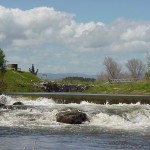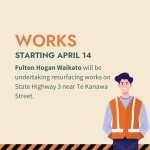
Added 10 months ago
Below is our submission on the Local Government (Electoral Legislation and Māori Wards and Māori Constituencies) Amendment Bill.
Ōtorohanga District Council (ŌDC) welcomes the opportunity to submit on the Local Government (Electoral Legislation and Māori Wards and Māori Constituencies) Amendment Bill.
We are opposed to the reinstatement of binding polls for Māori wards and Māori constituencies. We urge the Government to reconsider its position and leave us to make decisions about appropriate representation arrangements in partnership with Māori including iwi, hapū, marae and hapori Māori (Māori communities).
His Worship the Mayor, Max Baxter wishes to appear before the Select Committee in person to speak to our submission. He will be supported by our Chief Executive, Tanya Winter and our Rangiātea Ward Councillors, Cr Jaimee Tamaki and Cr Roy Willison.
Due to our travel arrangements, we would be available to speak between 11am-12.30pm and between 1.30pm-2.30pm.
Our District
The Ōtorohanga district covers 1976 square kilometres, from the peaceful seaside towns of Kāwhia and Aotea in the west, to tranquil Lake Arapuni on the eastern boundary. There are two urban centres of Ōtorohanga and Kāwhia, surrounded by thriving rural communities. Ōtorohanga district is part of the King Country region, known by Māori as 'Te Rohe Pōtae' - "The Area of the Hat." Our district extends along the west coast of the North Island from Mount Pirongia in the north to the coastal town of Kāwhia in the south and stretches inland to Pureora Forest Park and the Waikato River to the east.
Our district has a total population 10,690 of which 2,180 identify as Māori, while the township of Otorohanga has a population of approximately 3,000 and is a service centre for the surrounding rural areas. Kāwhia is a small coastal holiday resort located on the shores of the Kāwhia Harbour, 57 kilometres west of Ōtorohanga via State Highway 31. Kāwhia has a permanent population of approximately 400, but the population increases to over 2000 at peak holiday periods. Kāwhia is the spiritual home of the Tainui people who first settled there 600 to 700 years ago, with their ancestral waka laying at rest there behind Maketū Marae. The Kāwhia Harbour covers more than 6000 hectares, with five rivers feeding into it, and is a popular and productive fishing spot.
Our district also includes the small coastal settlement of Aotea, on the southern side of the Aotea Harbour. This is also a spiritual home for descendants of Aotea waka where they landed.
Our Council (Our Journey)
Ōtorohanga District Council (ŌDC) resolved to introduce Māori Wards in 2022. This was followed by a ‘Representation Review’ which proposed two additional seats in a Māori Ward we named ‘Rangiātea’ which is a place in our district and a place of origin for Māori. In putting in place the Rangiātea Ward, we decided not to undertake a full public consultation process as we believed that there would be no adverse impact on any residents in our district. In fact, we only saw the positives that would come from this representation: diversity around the Council table, addressing the consistent under-representation of Māori in local decision-making, having role models for our rangatahi so that they can see familiar faces to them in local government roles, and strengthening relationships between Council and iwi/Māori.
The views of Mana Whenua across the Ōtorohanga district
ŌDC have been working collaboratively alongside mana whenua across the district on a number of projects/plans/strategies. In good faith to the process ŌDC followed in establishing the Rangiātea Māori ward, we hosted a hui with mana whenua representatives to discuss the proposed Local Government Amendment Bill. Mana whenua present at this hui were from across the district and represented a number of Māori governance entities and authorities.
A resounding united voice was heard throughout the hui that reaffirmed the journey that ŌDC have been on with regard to building meaningful and enduring partnership relations with Māori across the district. The aspiration of all within the room was to hold fast to our current representation model with the Rangiātea Māori ward, and to continue building on the positive momentum to date with regard to partner relations.
ŌDC has a number of concerns in relation to the Local Government (Electoral Legislation and Māori Wards Constituencies) Amendment Bill. These are set out as follows.
Submission comments
We tautoko (support) the views in both the Taituarā and the LGNZ submission and we submit as follows:
- The decisions and actions of local authorities can and do give rise to breaches of the Treaty of Waitangi. Māori representation in the decision-making process is therefore essential.
- The Treaty of Waitangi guarantees Māori the right to make decisions over the resources and taonga they wish to retain. It commits the Crown to ensuring the rights and obligation of a New Zealand citizen apply equally to Māori.
- ŌDC makes decisions that impact on lands, waters and taonga. Decisions such as placement of infrastructure and levels of service, even the setting and enforcement of rates all have (or could have) such an impact.
- While not signatories to the Treaty, the decisions that our Council makes can easily impact on the Crown’s obligations to Māori. We should be cognisant of these principles and identify the impacts that these decisions will have.
- The Waitangi Tribunal has observed that “Alternative mechanisms for Māori participation in local government are not the same as having a dedicated seat at the council table”. While there are a number of ways that Māori can be involved in the decision-making process of councils, a Māori ward or constituency is the only mechanism that guarantees Māori representation on the body that makes the final decisions.
- This is a matter for local choice based on an informed consideration of the needs and preferences of the community, especially iwi and hapū.
- It is Council’s democratic right to decide matters of importance for and on behalf of our community
- We believe that a new threshold has been crossed, a threshold that absolutely contradicts the mandate that our Prime Minister’s political party campaigned on in the recent elections. The mandate was that this government was committed to devolve more responsibility to local councils and communities and empower communities through localism. The crux of localism is that we are able to make decisions that create the best outcomes for our people.
- The decision by the Minister of Local Government to demand councils across Aotearoa New Zealand either disestablish Māori wards or hold a poll that determines the future of Māori wards is not the decision of central government, that is with us, the councils across Aotearoa, the very bodies that are embracing Māori Wards as one of the mechanisms to create better working relationships with Māori/iwi.
- We respectfully suggest that the Minister has got this wrong and withdraws the Bill immediately.
- Restoring polls creates a higher procedural standard for Māori wards than apply to other decisions made in a representation review.
- The Bill proposes to restore provisions providing for the community to demand a poll on council decisions regarding Māori ward and constituencies. There is no such trigger for polls with regard to other decisions around wards and constituencies. The only other representation decision that may be overturned by poll is the decision on the voting system. The restoration of polls re-impose a higher procedural standard on one particular representation arrangement than applies to others.
- Reinstatement of polls will add additional costs to councils. Costs will vary from council to council but are not insignificant. This is not just in the administration of polls, but the potential impacts on out of cycle representation reviews. It is hard to see the benefits of this additional expenditure, especially at a time of significant funding challenges for councils and higher priority areas for investment. When the Minister of Local Government recently called on councils to ‘focus on the must haves, not the nice to haves… that's the focus that we expect from local government’ it is hard to see expenditure on these polls as a ‘must have’ in that context.
- As a small Council with limited resources this is an unhelpful distraction for us.
- We are progressing mahi in partnership with iwi right across our rohe and this extra work has the potential to not only take staff and financial resource away from that, but potentially undermines the relationships we have nurtured so carefully with iwi/Māori.
- Complex constitutional and political matters do not meaningfully reduce to a simple ‘yes’ or ‘no’.
- In what was a generally excellent piece of advice, the Department of Internal Affairs commented that:
“Referendums and polls are an instrument of majority rule which can supress minority interests. Normal lawmaking process have safeguards to make sure minority rights and interests are considered – human rights legislation, parliamentary debates and the select committee process. But referendums do not require that tabling and balancing of interests, and the outcome will depend on the majority’s perception of the minority interests.”
- We can only agree with this. We further note that The Right Honourable Christopher Luxon, Prime Minister of New Zealand is on public record as not supporting a referendum on Treaty principles in legislation. We agree that the complex constitutional, legal and political issues do not readily lend themselves to a ‘yes/no’ question. The restoration of referenda to decisions on Māori wards, including wards that have already been established, places local authorities in exactly that same position and should be avoided.
- We also concur with the view that former Local Government New Zealand President Dave Cull expressed when he said that:
“Of equal concern, the polls reduce a complex issue to a simple binary choice, which, by encouraging people to take sides, damages race relations in our districts. Matters of representation and relationships should be addressed in a deliberative manner that employs balanced and considered dialogue – not by poll. In fact, a poll is not necessary. Should a council resolve to establish Māori wards or constituencies, or any other ward, against the wishes of its community then the community has the option to hold that council to account at the next election – this is how representative democracy is intended to work.”
To close our submission, we draw upon the words of His Worship the Mayor – Max Baxter:
“Ōtorohanga District Council’s relationship with Māori/iwi is born on trust, nurtured through kōrero and grown through mutual respect. When that respect gets broken, the pathway to better outcomes is broken. We are yet to experience, and we have no expectation that there will ever be a negative outcome through working alongside Māori/iwi in creating positive sustainable outcomes for our community and country.”
Recommendations
- That Council’s democratic right to decide matters of importance for and on behalf of our community is recognised and restored through the withdrawal of this Bill.
- That Māori wards be decided by councils based on an informed consideration of the needs and preferences of the community, especially Māori including iwi, hapū, marae and hapori Māori.
- That the restoration of polls re-impose a higher procedural standard on one particular representation arrangement than applies to others, therefore, we do not support the proposal.
Contact
Graham Bunn
Group Manager, Business Enablement
Ōtorohanga District Council
More News

Easter and ANZAC hours

Ōtorohanga District Council signals support for Waikato Water Done Well

Night works for Fulton Hogan on State Highway 3

Book Sale!!

Scott Bainbridge Author Event
